
Bruker コラボウェビナー ~ミクロからマクロまで電池材料の横断的分析と電池特性~
【開催日時】 2024年9月25日 13:00 ~ 15:15
【ツール】 Zoom
【参加費】 無料

TGA Part 1 - Theory & Instrumentation
Monday, June 22 at 1:00 pm EDT
This lecture-based course covers all our TGA instruments, but is mainly designed around the Discovery TGA 55, 550, & 5500 instruments. The course will cover:
- Theory of operation
- Instrumentation
- Experimental parameters
- Software operation
- Calibration
- Maintenance & Troubleshooting
- Applications
Request More Information
Revolutionary New Fusion Cell™
Revolutionary new Fusion Cell™ further improves the performance on which you’ve come to rely. Better sensitivity, resolution, repeatability and industry leading baseline performance, enable detection of the weakest thermal transitions and the most accurate enthalpy and specific heat capacity.
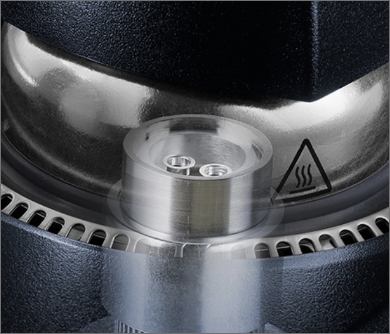
Powerful TRIOS Software
Revolutionary new Fusion Cell™ further improves the performance on which you’ve come to rely. Better sensitivity, resolution, repeatability and industry leading baseline performance, enable detection of the weakest thermal transitions and the most accurate enthalpy and specific heat capacity.

Modulated DSC®
Revolutionary new Fusion Cell™ further improves the performance on which you’ve come to rely. Better sensitivity, resolution, repeatability and industry leading baseline performance, enable detection of the weakest thermal transitions and the most accurate enthalpy and specific heat capacity.

RCS 120 Refrigerated Cooling System
Revolutionary new Fusion Cell™ further improves the performance on which you’ve come to rely. Better sensitivity, resolution, repeatability and industry leading baseline performance, enable detection of the weakest thermal transitions and the most accurate enthalpy and specific heat capacity.

High Throughput DSC Autosampler
Revolutionary new Fusion Cell™ further improves the performance on which you’ve come to rely. Better sensitivity, resolution, repeatability and industry leading baseline performance, enable detection of the weakest thermal transitions and the most accurate enthalpy and specific heat capacity.

New Microscope Accessory
Revolutionary new Fusion Cell™ further improves the performance on which you’ve come to rely. Better sensitivity, resolution, repeatability and industry leading baseline performance, enable detection of the weakest thermal transitions and the most accurate enthalpy and specific heat capacity.

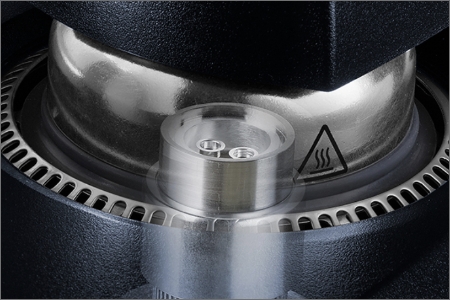
Revolutionary New Fusion Cell™
Revolutionary new Fusion Cell™ further improves the performance on which you’ve come to rely. Better sensitivity, resolution, repeatability and industry leading baseline performance, enable detection of the weakest thermal transitions and the most accurate enthalpy and specific heat capacity.
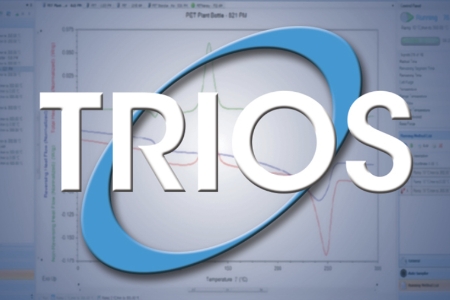
Powerful TRIOS Software
Discover powerful TRIOS software that delivers exceptional user experience in a combined package for instrument control, data analysis and reporting for thermal analysis and rheology. New features such as automated calibration routines, multiple calibration sets, real-time test method editing, and inter-laboratory data and test method sharing provide unmatched flexibility, while one-click analysis and custom reporting raise productivity to new levels.
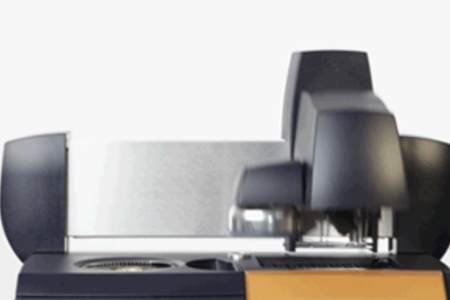
High Throughput DSC Autosampler
It’s hard to believe we could improve on the most reliable DSC autosampler on the market, but we did! The new linear autosampler was designed to be even more rugged and simpler to use than ever before.
Discover powerful TRIOS software that delivers exceptional user experience in a combined package for instrument control, data analysis and reporting for thermal analysis and rheology. New features such as automated calibration routines, multiple calibration sets, real-time test method editing, and inter-laboratory data and test method sharing provide unmatched flexibility, while one-click analysis and custom reporting raise productivity to new levels.
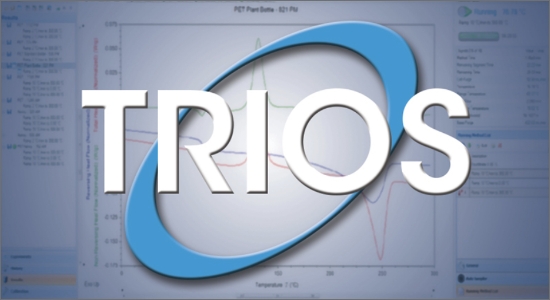
Discover powerful TRIOS software that delivers exceptional user experience in a combined package for instrument control, data analysis and reporting for thermal analysis and rheology. New features such as automated calibration routines, multiple calibration sets, real-time test method editing, and inter-laboratory data and test method sharing provide unmatched flexibility, while one-click analysis and custom reporting raise productivity to new levels.

Discover powerful TRIOS software that delivers exceptional user experience in a combined package for instrument control, data analysis and reporting for thermal analysis and rheology. New features such as automated calibration routines, multiple calibration sets, real-time test method editing, and inter-laboratory data and test method sharing provide unmatched flexibility, while one-click analysis and custom reporting raise productivity to new levels.

Discover powerful TRIOS software that delivers exceptional user experience in a combined package for instrument control, data analysis and reporting for thermal analysis and rheology. New features such as automated calibration routines, multiple calibration sets, real-time test method editing, and inter-laboratory data and test method sharing provide unmatched flexibility, while one-click analysis and custom reporting raise productivity to new levels.

Discover powerful TRIOS software that delivers exceptional user experience in a combined package for instrument control, data analysis and reporting for thermal analysis and rheology. New features such as automated calibration routines, multiple calibration sets, real-time test method editing, and inter-laboratory data and test method sharing provide unmatched flexibility, while one-click analysis and custom reporting raise productivity to new levels.

- Fusion Cell™ with patented technology provides unrivaled performance in baseline flatness, sensitivity, resolution, and reproducibility. Its superb technology enables detection of the weakest thermal transitions and the most accurate enthalpy and specific heat capacity measurements.
- Enhanced Tzero heat flow technology for the X3 guarantees temperature and enthalpy accuracy simultaneously on all three samples
- High-end performance with three sample calorimeters provide unmatched flexibility from replicate testing for statistical analysis to validation/verification against a control sample for the ultimate in certainty
- Modulated DSC® (MDSC®) for the most efficient separation of complex thermal events.
- One-Touch-Away™ User Interface enhances usability and access to data on the instrument.
- Reliable linear autosampler with 54 programmable tray positions for worry-free 24/7 operation, flexible programming of experiments, and automated calibration and verification routines.
- Widest range of refrigerated cooling options eliminates liquid nitrogen expense and ensures uninterrupted sub-ambient operation during extended autosampler routines.
- Tzero Press and pans for fast, simple, and reproducible sample preparation.
- Powerful software that delivers an exceptional user experience in a combined package for instrument control, data analysis, and reporting. Features such as automated calibration routines and real-time test method editing provide unmatched flexibility, while One-Click analysis and custom reporting raise productivity to new levels.
- Commitment to quality backed by the industry’s ONLY five-year cell and furnace warranty for peace of mind.
| Instrument Features | |
|---|---|
| Fusion Cell™ | X3 DSC |
| MDSC |  |
| Enhanced Tzero Heat Flow |  |
| User Replaceable Cell |  |
| 54-Position Autosampler |  |
| Dual Input Gas-Delivery Manifold |  |
| Color App-Style Touch Screen |  |
 Included Included |
|
Revolutionary New Fusion Cell™
Revolutionary new Fusion Cell™ further improves the performance on which you’ve come to rely. Better sensitivity, resolution, repeatability and industry leading baseline performance, enable detection of the weakest thermal transitions and the most accurate enthalpy and specific heat capacity.

Powerful TRIOS Software
Revolutionary new Fusion Cell™ further improves the performance on which you’ve come to rely. Better sensitivity, resolution, repeatability and industry leading baseline performance, enable detection of the weakest thermal transitions and the most accurate enthalpy and specific heat capacity.

Modulated DSC®
Revolutionary new Fusion Cell™ further improves the performance on which you’ve come to rely. Better sensitivity, resolution, repeatability and industry leading baseline performance, enable detection of the weakest thermal transitions and the most accurate enthalpy and specific heat capacity.

RCS 120 Refrigerated Cooling System
Revolutionary new Fusion Cell™ further improves the performance on which you’ve come to rely. Better sensitivity, resolution, repeatability and industry leading baseline performance, enable detection of the weakest thermal transitions and the most accurate enthalpy and specific heat capacity.

High Throughput DSC Autosampler
Revolutionary new Fusion Cell™ further improves the performance on which you’ve come to rely. Better sensitivity, resolution, repeatability and industry leading baseline performance, enable detection of the weakest thermal transitions and the most accurate enthalpy and specific heat capacity.

New Microscope Accessory
Revolutionary new Fusion Cell™ further improves the performance on which you’ve come to rely. Better sensitivity, resolution, repeatability and industry leading baseline performance, enable detection of the weakest thermal transitions and the most accurate enthalpy and specific heat capacity.

Refrigerated Cooling Systems (RCS)
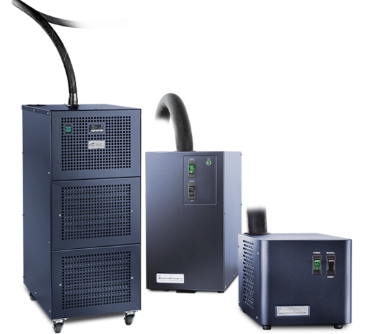
Take advantage of the convenient Refrigerated Cooling Systems (RCS) for unattended DSC and MDSC® operation over broad temperature ranges. The new RCS 120 provides enhanced safety and is the only liquid nitrogen-free system capable of conducting experiments down to -120°C.
RCS Features and Benefits:
- One-, Two-, or Three-stage refrigeration systems that achieve temperature ranges down to -40 °C, -90 °C or -120 °C
- Sealed system eliminates the need for liquid nitrogen cooling
- Enables cycling, MDSC®, controlled, and ballistic cooling experiments
- Safe, convenient, and continuous cooling operation for your laboratory needs
Refrigerated Cooling Systems (RCS)

Take advantage of the convenient Refrigerated Cooling Systems (RCS) for unattended DSC and MDSC® operation over broad temperature ranges. The new RCS 120 provides enhanced safety and is the only liquid nitrogen-free system capable of conducting experiments down to -120°C.
RCS Features and Benefits:
- One-, Two-, or Three-stage refrigeration systems that achieve temperature ranges down to -40 °C, -90 °C or -120 °C
- Sealed system eliminates the need for liquid nitrogen cooling
- Enables cycling, MDSC®, controlled, and ballistic cooling experiments
- Safe, convenient, and continuous cooling operation for your laboratory needs
Refrigerated Cooling Systems (RCS)

Take advantage of the convenient Refrigerated Cooling Systems (RCS) for unattended DSC and MDSC® operation over broad temperature ranges. The new RCS 120 provides enhanced safety and is the only liquid nitrogen-free system capable of conducting experiments down to -120°C.
RCS Features and Benefits:
- One-, Two-, or Three-stage refrigeration systems that achieve temperature ranges down to -40 °C, -90 °C or -120 °C
- Sealed system eliminates the need for liquid nitrogen cooling
- Enables cycling, MDSC®, controlled, and ballistic cooling experiments
- Safe, convenient, and continuous cooling operation for your laboratory needs
Refrigerated Cooling Systems (RCS)

Take advantage of the convenient Refrigerated Cooling Systems (RCS) for unattended DSC and MDSC® operation over broad temperature ranges. The new RCS 120 provides enhanced safety and is the only liquid nitrogen-free system capable of conducting experiments down to -120°C.
RCS Features and Benefits:
- One-, Two-, or Three-stage refrigeration systems that achieve temperature ranges down to -40 °C, -90 °C or -120 °C
- Sealed system eliminates the need for liquid nitrogen cooling
- Enables cycling, MDSC®, controlled, and ballistic cooling experiments
- Safe, convenient, and continuous cooling operation for your laboratory needs
Refrigerated Cooling Systems (RCS)

Take advantage of the convenient Refrigerated Cooling Systems (RCS) for unattended DSC and MDSC® operation over broad temperature ranges. The new RCS 120 provides enhanced safety and is the only liquid nitrogen-free system capable of conducting experiments down to -120°C.
RCS Features and Benefits:
- One-, Two-, or Three-stage refrigeration systems that achieve temperature ranges down to -40 °C, -90 °C or -120 °C
- Sealed system eliminates the need for liquid nitrogen cooling
- Enables cycling, MDSC®, controlled, and ballistic cooling experiments
- Safe, convenient, and continuous cooling operation for your laboratory needs
TRIOS Software
Discover powerful TRIOS software that delivers exceptional user experience in a combined package for instrument control, data analysis and reporting. New features such as automated calibration routines, multiple calibration sets, real-time test method editing, and inter-laboratory data and test method sharing provide unmatched flexibility, while one-click analysis and custom reporting raise productivity to new levels.
TRIOS Features & Benefits:
- Control multiple instruments with a single PC and software package
- Overlay and compare results across techniques including DSC, TGA, DMA, SDT and rheometers.
- Unlimited licensing and free lifetime software upgrades.
- One-Click analysis for increased productivity.
- Automated custom report generation including: experimental details, data plots and tables, control charts and analysis results.
- Convenient data export to plain-text, CSV, XML, Excel®, Word®, PowerPoint®, and image formats.
- Optional TRIOS Guardian with electronic signatures for audit trail and data integrity.• Modulated DSC® (MDSC®) for the most efficient separation of complex thermal events.
Ease-of-Use
TRIOS software makes calibration of the entire line of Differential Scanning Calorimeters simple. Users can easily generate multiple calibration data sets under varying experimental conditions (e.g. different heating rates or gas selections) and seamlessly switch between them to match the experimental conditions used for sample testing. Real-time signals and the progress of running experiments is readily available, with the added capability of modifying a running method on the fly. TRIOS software offers a level of flexibility that is unmatched in the industry.
Ease-of-Use
TRIOS software makes calibration of the entire line of Differential Scanning Calorimeters simple. Users can easily generate multiple calibration data sets under varying experimental conditions (e.g. different heating rates or gas selections) and seamlessly switch between them to match the experimental conditions used for sample testing. Real-time signals and the progress of running experiments is readily available, with the added capability of modifying a running method on the fly. TRIOS software offers a level of flexibility that is unmatched in the industry.
Ease-of-Use
TRIOS software makes calibration of the entire line of Differential Scanning Calorimeters simple. Users can easily generate multiple calibration data sets under varying experimental conditions (e.g. different heating rates or gas selections) and seamlessly switch between them to match the experimental conditions used for sample testing. Real-time signals and the progress of running experiments is readily available, with the added capability of modifying a running method on the fly. TRIOS software offers a level of flexibility that is unmatched in the industry.
Ease-of-Use
TRIOS software makes calibration of the entire line of Differential Scanning Calorimeters simple. Users can easily generate multiple calibration data sets under varying experimental conditions (e.g. different heating rates or gas selections) and seamlessly switch between them to match the experimental conditions used for sample testing. Real-time signals and the progress of running experiments is readily available, with the added capability of modifying a running method on the fly. TRIOS software offers a level of flexibility that is unmatched in the industry.
Ease-of-Use
TRIOS software makes calibration of the entire line of Differential Scanning Calorimeters simple. Users can easily generate multiple calibration data sets under varying experimental conditions (e.g. different heating rates or gas selections) and seamlessly switch between them to match the experimental conditions used for sample testing. Real-time signals and the progress of running experiments is readily available, with the added capability of modifying a running method on the fly. TRIOS software offers a level of flexibility that is unmatched in the industry.
TGA Part 1 - Theory & Instrumentation
Monday, June 22 at 1:00 pm EDT
This lecture-based course covers all our TGA instruments, but is mainly designed around the Discovery TGA 55, 550, & 5500 instruments. The course will cover:
- Theory of operation
- Instrumentation
- Experimental parameters
- Software operation
- Calibration
- Maintenance & Troubleshooting
- Applications
TGA Part 2 - Applications
Tuesday, June 23 at 1:00 pm EDT
This lecture-based course covers all our TGA instruments, but is mainly designed around the Discovery TGA 55, 550, & 5500 instruments. The course will cover:
- Theory of operation
- Instrumentation
- Experimental parameters
- Software operation
- Calibration
- Maintenance & Troubleshooting
- Applications
Request More Information
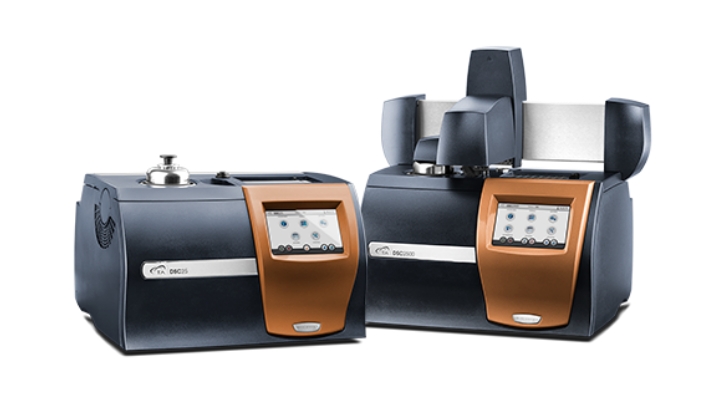
Trade in your Q Series DSC system and SAVE 40% on a NEW Discovery DSC
The world’s finest line of Differential Scanning Calorimeters
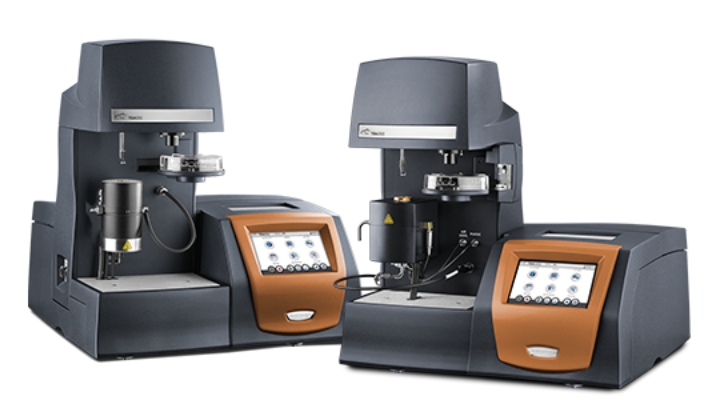
Trade in your Q Series DSC system and SAVE 40% on a NEW Discovery DSC
The world’s finest line of Differential Scanning Calorimeters
13:00 ~ 13:45
株式会社ダイネンマテリアル
奥井 一 氏
【題目】ミクロからマクロまで電池材料の横断的 分析と電池特性
【概要】リチウムイオン電池では重要部材として正極材、負極材を中心に粉体材料が多く使用されている。これら電池材料は、材料物性を適切に把握し電池を仕上げる必要があるが、ミクロからマクロまで横断的に分析アプローチする事例は少ない。具体的には、工程上流での材料構造などを解析するXRD、FTIRなどのミクロ分析と工程中流のスラリーレオロジーなどのマクロ分析技法はリンクしにくい。本公演では具体的な事例を紹介しディスカッションする。
13:45 ~ 14:30
ブルカージャパン株式会社
森岡 仁 氏
【題目】XRDを用いたリチウムイオン電池材料のnmオーダー構造解析
【概要】X線回折(XRD)は非破壊でサブnmからnmオーダーの構造を解析することができる分析手法です。本ウェビナーでは、最初にXRDの原理と得られる情報を整理します。その後、リチウムイオン電池材料、特に負極材であるグラファイト系材料における評価事例をご紹介します。XRDで得られる構造情報とリチウムイオン電池の電池特性との相関について知りたい方に有益です。
14:30 ~ 15:15
ティー・エイ・インスツルメント・ジャパン株式会社 アプリケーション課
川田 友紀
【題目】材料のミクロと電池をつなぐレオロジー・熱分析によるマクロ物性評価
【概要】レオロジーや熱分析といった材料のマクロ物性を評価する分析手法は、電池部材の性能評価や製造プロセスの工程管理分析などで用いられています。本ウェビナーでは、電極材料のスラリーレオロジーおよび水分吸着特性に焦点を当て、それらの評価手法について説明するとともに、リチウムイオン電池の負極材であるグラファイト系材料の測定事例も紹介します。
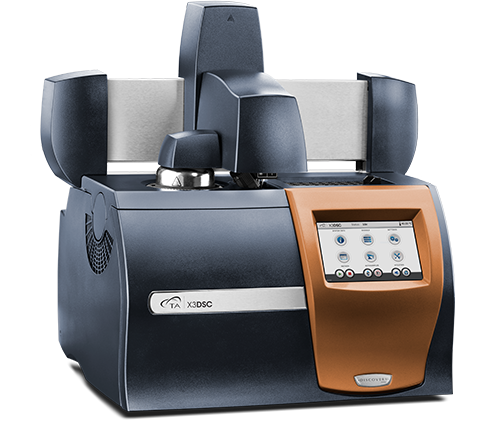
Discovery DSC
- New FusionCell™ with patented technology for unrivaled performance
- Exclusive Tzero® heat flow technology for ultimate DSC performance
- Unmatched baseline stability that requires no subtractions
- New linear 54-position autosampler
TGA Part 1 - Theory & Instrumentation
Monday, June 22 at 1:00 pm EDT
This lecture-based course covers all our TGA instruments, but is mainly designed around the Discovery TGA 55, 550, & 5500 instruments. The course will cover:
TGA Part 1 - Theory & Instrumentation
Monday, June 22 at 1:00 pm EDT
This lecture-based course covers all our TGA instruments, but is mainly designed around the Discovery TGA 55, 550, & 5500 instruments. The course will cover:
TGA Part 1 - Theory & Instrumentation
Monday, June 22 at 1:00 pm EDT
This lecture-based course covers all our TGA instruments, but is mainly designed around the Discovery TGA 55, 550, & 5500 instruments. The course will cover:
TGA Part 1 - Theory & Instrumentation
Monday, June 22 at 1:00 pm EDT
This lecture-based course covers all our TGA instruments, but is mainly designed around the Discovery TGA 55, 550, & 5500 instruments. The course will cover:
TGA Part 1 - Theory & Instrumentation
Monday, June 22 at 1:00 pm EDT
This lecture-based course covers all our TGA instruments, but is mainly designed around the Discovery TGA 55, 550, & 5500 instruments. The course will cover:
TGA Part 1 - Theory & Instrumentation
Monday, June 22 at 1:00 pm EDT
This lecture-based course covers all our TGA instruments, but is mainly designed around the Discovery TGA 55, 550, & 5500 instruments. The course will cover:
TGA Part 1 - Theory & Instrumentation
Monday, June 22 at 1:00 pm EDT
This lecture-based course covers all our TGA instruments, but is mainly designed around the Discovery TGA 55, 550, & 5500 instruments. The course will cover:
TGA Part 1 - Theory & Instrumentation
Monday, June 22 at 1:00 pm EDT
This lecture-based course covers all our TGA instruments, but is mainly designed around the Discovery TGA 55, 550, & 5500 instruments. The course will cover:
TGA Part 1 - Theory & Instrumentation
Monday, June 22 at 1:00 pm EDT
This lecture-based course covers all our TGA instruments, but is mainly designed around the Discovery TGA 55, 550, & 5500 instruments. The course will cover:
TGA Part 1 - Theory & Instrumentation
Monday, June 22 at 1:00 pm EDT
This lecture-based course covers all our TGA instruments, but is mainly designed around the Discovery TGA 55, 550, & 5500 instruments. The course will cover:

Discovery DSC
- New FusionCell™ with patented technology for unrivaled baseline flatness, sensitivity, and resolution
- Exclusive Tzero® heat flow technology for ultimate DSC performance
- Unmatched baseline stability that requires no subtractions
- New linear 54-position autosampler
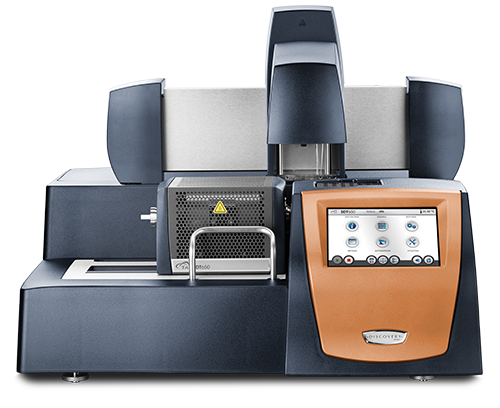
Discovery SDT
- Simultaneous DSC/TGA
- Advanced modes for heat capacity, kinetic studies, and better resolution
- Horizontal dual-beam design for superior heat flow and weight measurements
- New 30-position autosampler with programmable tray positions
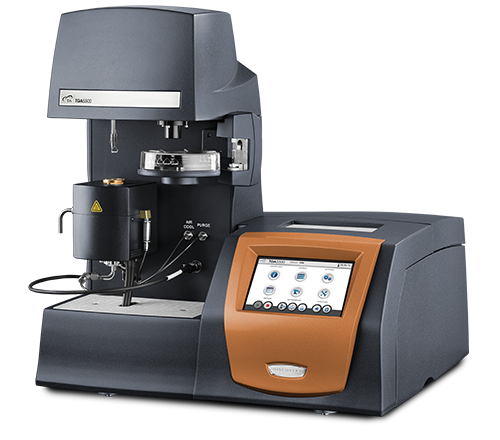
Discovery TGA
- New ultrasensitive proprietary Tru-Mass™ thermobalance
- The most accurate real-time data
- Superior atmosphere control to meet the most demanding applications
- Rugged & reliable automation

Discovery DSC
- New FusionCell™ with patented technology for unrivaled baseline flatness, sensitivity, and resolution
- Exclusive Tzero® heat flow technology for ultimate DSC performance
- Unmatched baseline stability that requires no subtractions
- New linear 54-position autosampler

Discovery DSC
- New FusionCell™ with patented technology for unrivaled baseline flatness, sensitivity, and resolution
- Exclusive Tzero® heat flow technology for ultimate DSC performance
- Unmatched baseline stability that requires no subtractions
- New linear 54-position autosampler

Discovery DSC
- New FusionCell™ with patented technology for unrivaled baseline flatness, sensitivity, and resolution
- Exclusive Tzero® heat flow technology for ultimate DSC performance
- Unmatched baseline stability that requires no subtractions
- New linear 54-position autosampler
ウェビナーに登録する
※ご登録のお客様からお預かりしました個人情報につきましては、弊社および講演会社でのみ共有し、その他の第三者に開示・提供することは致しません。
